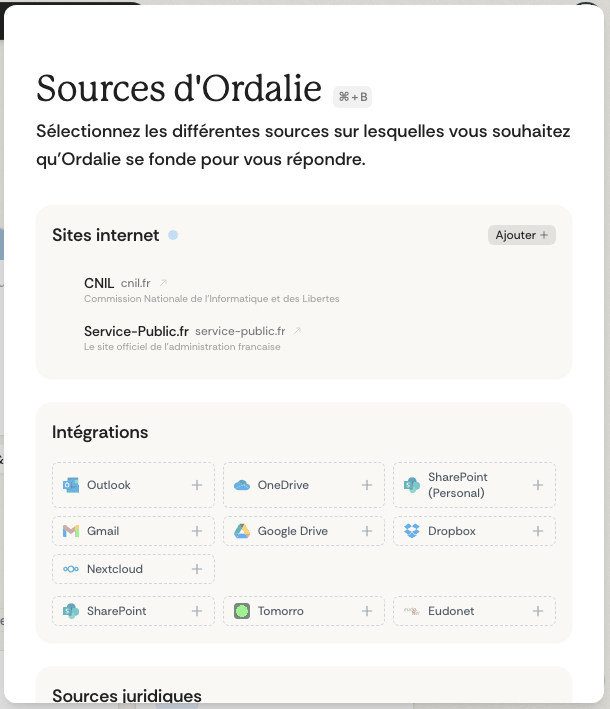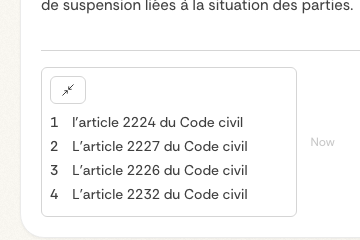Sources
Ordalie relies on a complete and configurable legal knowledge base to provide precise and documented answers. The sources system allows you to finely control which information is used during your research and analyses, while offering you the possibility to enrich the base with your own data.
Ordalie’s Sources
French Legal Corpus
Ordalie integrates the entire official French legal corpus, including 102 complete French legal codes constantly updated. This base covers all areas of law:
- Main Codes: Civil Code, Commercial Code, Labor Code, Penal Code, Civil Procedure Code, Criminal Procedure Code, etc.
- Specialized Codes: Public Health Code, Environmental Code, Urban Planning Code, Intellectual Property Code, etc.
- Non-codified laws and official ordinances published in the Official Journal
- Case law from the Court of Cassation, Council of State, Courts of Appeal, Administrative Courts of Appeal, and certain first-instance courts
- Official Public Finance Bulletin (BOFiP) for administrative tax documentation
European Law
Ordalie's European corpus includes texts from EUR-Lex, the official database of European Union law:
- All current European regulations and directives, with enhanced search to precisely target these texts
- Case law from the Court of Justice of the European Union (CJEU) and the General Court of the European Union (GCEU)
Configuring Legal Sources

You can customize which legal sources Ordalie uses during its analyses. Access the configuration via the Ctrl + B shortcut or from the search settings.
Organization of sources by families
Ordalie’s legal sources are organized into three main families, which you can activate or deactivate independently according to your needs:
Normative Sources: This includes all legislation and regulations. This family includes all codes (Civil Code, Commercial Code, Labor Code, etc.), non-codified laws, ordinances, and decrees published in the Official Journal.
Judicial Sources: This category includes all court decisions. You can refine your selection by choosing the jurisdictions that interest you: Court of Cassation, Council of State, Courts of Appeal, Administrative Courts of Appeal, or first-instance courts. This granularity allows you to focus your research on the most relevant case law for your field.
Analytical Sources: This includes legal commentaries, analyses, and doctrines. This family notably includes the Official Public Finance Bulletin (BOFiP) for taxation, as well as other official doctrine sources.
Fine-tuned customization
Beyond these broad categories, you can:
- Exclude specific codes that are not relevant to your practice
- Filter by jurisdiction to consult only certain courts
- Refine results by focusing on legal areas that concern you
For example, a lawyer specializing in business law can choose to exclude public health or urban planning codes while maintaining access to commercial case law from the Court of Cassation.
Company Information Search
In addition to classic legal sources, Ordalie allows you to quickly obtain official information on French, British, or American companies. Simply enter a company name or SIREN number (for France) in your search, and Ordalie automatically retrieves available public data: legal form, registered office address, directors, share capital, etc. This feature is particularly useful when analyzing contracts or conducting due diligence.
Your Personal Sources
Ordalie allows you to enrich its knowledge base with your own sources, creating a tool perfectly adapted to your practice. All your sources remain strictly private and are never accessible to other users. You can also connect external sources via Integrations.
Internet Sources
You can configure Ordalie to index trusted websites that will enrich your research. This feature distinguishes between free and Pro accounts:
- Free accounts: up to 2 websites
- Pro accounts: unlimited websites
Commonly added sites include service-public.fr, conseil-etat.fr, courdecassation.fr, defenseurdesdroits.fr, cnil.fr, or sites specialized in your field of expertise.
Configuration: From the source configuration modal, click “Add” in the “Internet Sources” section. You can activate or deactivate each source individually according to your needs.
Operation: Ordalie automatically crawls and indexes the content of these sites. During your research, relevant information from these sources is integrated into responses, with precise references to original pages.
💡 Need a source that's not yet available? We regularly expand our legal source database. If you need a specific source, reach out to us at [email protected] — we review every request.
Sources in Responses
Automatic Citation Detection
Ordalie uses an automatic citation detection system that analyzes legal references in real-time in generated responses. This system automatically identifies and formats:
- References to code articles
- Case law citations
- Mentions of regulatory texts
- References to your personal source documents
Sources Panel

Each Ordalie response is accompanied by a sources panel that presents:
- List of cited sources with direct links to original texts
- Relevant excerpts from documents used to construct the response
- Precise references (articles, judgment numbers, pages) for verification
- Mixed sources combining public law, your internal documents, and configured websites
Complete Traceability
All information provided by Ordalie is accompanied by its sources, guaranteeing complete traceability and allowing you to verify each element of the response. This approach respects the rigor requirements of legal work while saving you considerable time in your research.